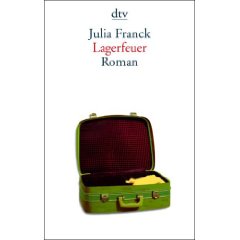20 years after the fall of the Berlin Wall it is easy to forget what all the fuss was about. The fate of those who risked everything to make it to the west, and who then often struggled to navigate their way in a strange world, has been largely forgotten. Julia Franck, in her 2003 novel Lagerfeuer ("Campfire"), won't let us forget. The novel takes place 10 years before the Wende, and follows three people who made it across the border – for very different reasons – and whose lives intersect in a West Berlin"reception camp" (Aufnahmelager).
The central figure in Lagerfeuer is the young mother of two, Nelly Senf, who is still grieving over the suicide of her lover – the father of her children – as she crosses into the west. Or was it a suicide? Is he really dead? These are just two of the questions raised in the book as Nelly tries to make sense of what happened to her in East Germany.
The first 30 pages of Lagerfeuer describe Nelly's ordeal at the hands of the East German border guards and are supremely suspenseful. Here is none of the "Ostalgia" of Goodbye Lenin; the reader is confronted with historical reality of the Unrechtsstaat. We learn that Nelly is a Jew, that she is a trained chemist who was deemed an enemy of the state and forced to work in a cemetery. Her humililating "interrogation" is nothing less than inhuman torture – nor are her children entirely spared in the process.
Unfortunately, the narrative force of the first chapter doesn't hold through the entire novel. Nelly is fully realized as a character, but the others – a middle-age Polish woman caring for her aging father and dying brother, an actor suffering from obsessive compulsive disorder who had been in an East German prison – are not as completely drawn. And Julia Franck overreaches with John Bird, an African-American intelligence officer who dreams of a glamorous CIA career: he is simply too far beyond her imagination to capture realistically.
But what Julia Franck does get right, and why Lagerfeuer is well worth reading, is her vivid description of the hellish existence in the reception camp. It quickly becomes apparent that Nelly and the other refugees from the east have exchanged one type of prison for another. We know that Franck as a young girl spent time in an Aufnahmelager and every detail has apparently been etched into her memory. Life in the camp is pure misery, Those tasked with helping the refugees find employment and "integration" into the free market society have nothing but contempt for their charges. The children from the east are bullied in school for their shabby clothes and strange haircuts. The culture of surveillance they experienced in East Germany lives on in the camp, with the refugees spying and informing on each other. Stasi spies are rumored to be everywhere. Nelly finds herself in a place surrounded by walls and guards in a city itself surrounded by walls. "Freedom" is nothing more than one more dashed hope.
In a sense, Lagerfeuer is a warm-up for Julia Franck's best novel to date – Die Mittagsfrau (2007). The central figure in the later novel shares many of the characteristics of Nelly, and the same themes of abandonment and grief are dealt with, but in a much more sustained way. Julia Franck continues to develop her art and grow as one of best post-Wende writers. Unfortunately for American readers, the English translation of Die Mittagsfrau – The Blind Side of the Heart – is still not available here and must be ordered from the UK.
For another take on Lagerfeuer, read Katy Derbyshire's review in love german books.


